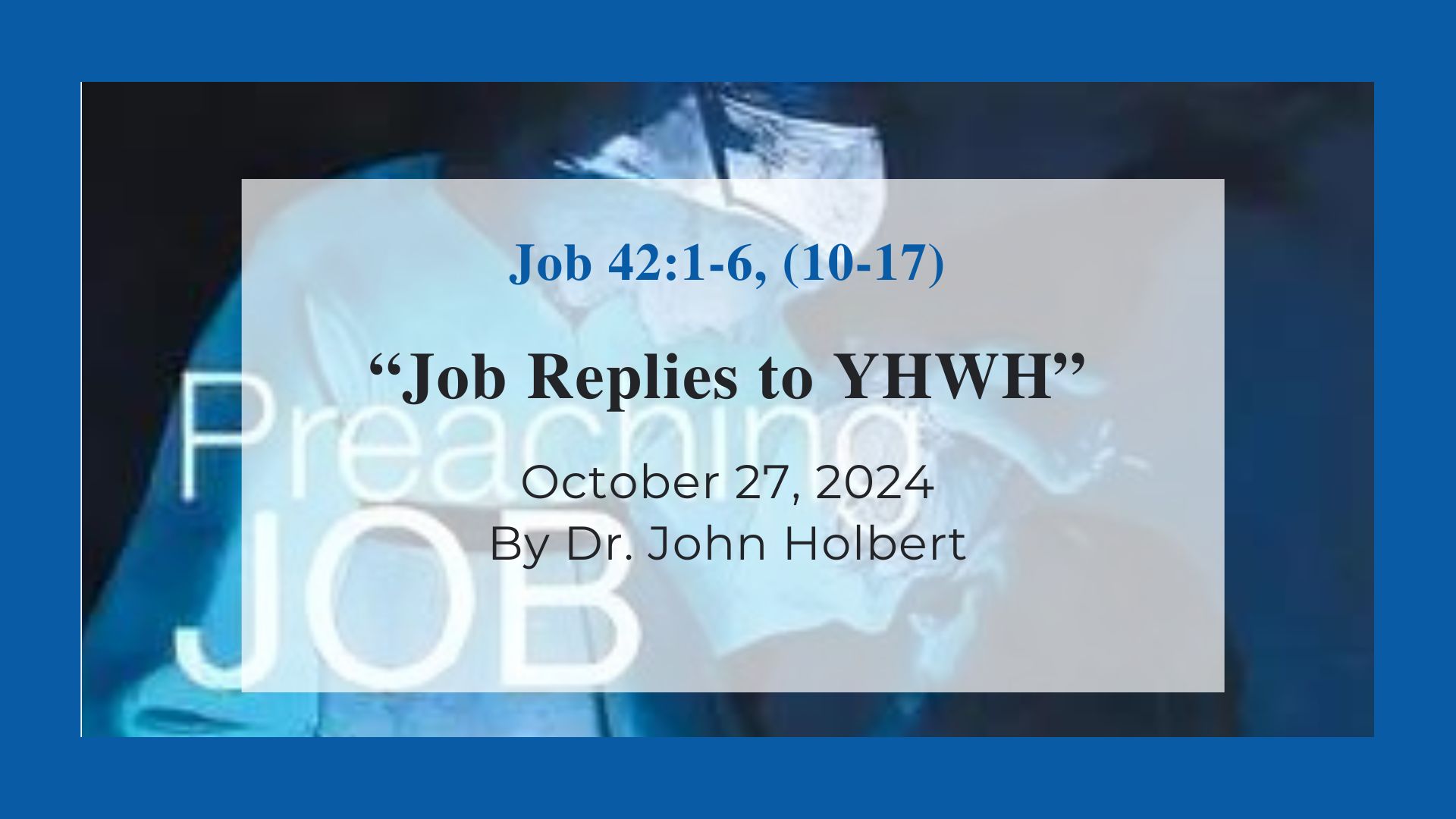Job's Reply to YHWH - Reflections on Job 42:1-6, 10-17, Proper 25 Year B
by John Holbert on Monday, October 21, 2024

Proper 25. October 27, 2024. Job 42:1-6, 10-17. “Job Replies to YHWH”
The title over my NRSV text of Job 42, supplied by the editors, reads, “Job is Humbled and Satisfied.” Well, that is one way to hear what the loudmouth from Uz is doing in this last speech in the book. But it is hardly the only way to hear what Job has said to YHWH. Last week in my reading of Job 38, I suggested that YHWH, far from wanting Job to shut up in the face of divine power, rather urges him to respond to the vast cosmogonic and zoological display that YHWH offers him. And so here Job responds.
I readily admit that I have heard this speech in multiple ways. In my 50-year-old dissertation, I was convinced that Job spoke in deep bitterness and with rich irony, continuing his mode of address throughout the book. My work then was convinced that the author of Job was intent on rooting out any remnant of traditional theological beliefs, any idea that the universe was based on a reward and punishment model. Hence, any idea that Job would be either humbled or satisified was far from the point of things for me. The fact that I was writing my dissertation during the summer of the infamous Watergate hearings that led to the resignation of Richard Nixon from the presidency may well have added to my conviction that irony and necessary attempts to undermine authority were baked into the universe, and that the author of Job was adding to that notion. I no longer hear this speech exactly like that, though I still sense a multi-level intelligence at work.
Here is my translation of Job’s speech:
Job answered YHWH and said,
“You know that you can do anything,
and no purpose of yours can be thwarted.”
(You said) ‘Who is this obscuring design without knowledge?’
“Thus, I spoke but did not understand,
wonders beyond me that I did not know.”
(You said) ‘Listen now, and I will speak;
let me ask you, that you might inform me.’
“By the ear’s hearing I heard of you,
and now my eye has seen you.
Therefore, I recant,
and change my mind on dust and ashes.”
So, what is Job saying and doing in this tiny speech? First, he is replying to the call from YHWH to speak, and quotes YHWH twice to indicate that he, Job, has been listening to YHWH carefully. Second, he readily admits that he spoke in ignorance, having heard of YHWH only from “hearing,” rumor, hearsay. But now he has actually seen YHWH, and that God is apparently quite different than the rumors have suggested. Third, he does NOT repent! However much many commentators may wish he repented, coming to the mourner’s bench in abject humility, tears streaming down the sinner’s face, the word sometimes translated “repent” hardly means that here. What the word may mean is best seen in its use at a crucial place in the tale of Exodus, as Moses confronts YHWH on the mountain of Horeb. There, Ex.32:14, after Moses has daringly confronted YHWH’s desire to destroy the calf-building Israelites at the base of the mountain with arguments against that divine desire, presents arguments so convincing that YHWH “changed the divine mind” and did not do it. The verb is the same as one finds here in Job 42:6.
It must also be said that the NRSV has egregiously mistranslated this verse. At no place in the Hebrew can it said that Job claims to “despise himself;” the translators have made that up out of thin air! The verb used means something like either “melt” or “recant” of what one had said earlier. What the verse appears to imply is that Job has changed from bitter accuser to one who can now find purpose in life, even though he is still on dust and ashes. In short, Job no longer desires to condemn YHWH in order that he might be justified, as YHWH suggested (Job 40:8). But neither does Job repent; he recants his ignorant comments, and sits still on his dust and ashes. One might call this act one of repentance, but it is not filled with abject humility, nor does it say that Job is somehow satisfied. Job is willing to live in a world where God cannot be simply understood, a universe where God possesses mysterious power, beyond all human conception.
And we should note that in the prose end of the book, vss.7-17, Job returns to the community with money and a new family, dying in a ripe old patriarchal age. And the friends, with Eliphaz as their representative, get their comeuppance, because they “have not spoken rightly, like my servant Job,” as YHWH makes plain. How has Job “spoken rightly”? He has refused to deny his own eyes when it came to the nonsense of reward and punishment, unlike the friends who held tightly to that ridiculous claim in spite of Job’s constant denial of it, based on the evidence of his own experience.
Has the author given us a neat theological view to replace that reward and punishment one? No. The universe remains mysterious, filled with darkness and light, monstrous creatures like Behemoth and Leviathan, and singing morning stars. It is world of YHWH and Job, as long as Job can accept his proper place in it, a place of dust and ashes, a very human place. And so must we all.
